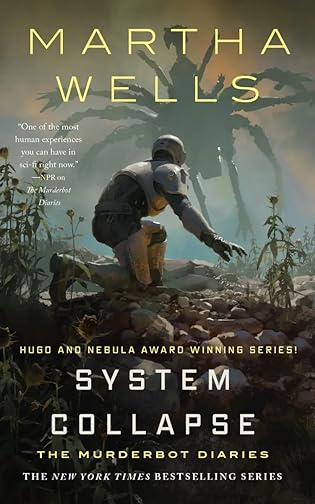 System Collapse (The Murderbot Diaries, #7) by Martha Wells
System Collapse (The Murderbot Diaries, #7) by Martha Wells Format: eARC
Source: supplied by publisher via Edelweiss
Formats available: hardcover, ebook, audiobook
Genres: science fiction, space opera
Series: Murderbot Diaries #7
Pages: 256
Published by Tordotcom on November 14, 2023
Purchasing Info: Author's Website, Publisher's Website, Amazon, Barnes & Noble, Kobo, Bookshop.org, Better World Books
Goodreads
Am I making it worse? I think I'm making it worse.
Everyone's favorite lethal SecUnit is back.
Following the events in Network Effect, the Barish-Estranza corporation has sent rescue ships to a newly-colonized planet in peril, as well as additional SecUnits. But if there’s an ethical corporation out there, Murderbot has yet to find it, and if Barish-Estranza can’t have the planet, they’re sure as hell not leaving without something. If that something just happens to be an entire colony of humans, well, a free workforce is a decent runner-up prize.
But there’s something wrong with Murderbot; it isn’t running within normal operational parameters. ART’s crew and the humans from Preservation are doing everything they can to protect the colonists, but with Barish-Estranza’s SecUnit-heavy persuasion teams, they’re going to have to hope Murderbot figures out what’s wrong with itself, and fast!
Yeah, this plan is... not going to work.
My Review:
The system that is collapsing in Murderbot’s seventh outing is Murderbot’s own – and it’s angsting about it in ways that are not remotely leading to optimal performance. Which in turn is leading to even less optimal performance.
In other words, as we check back into Murderbot’s usually snarkastic consciousness, Murderbot is a mess and doing its best to hide the full depth of its mess from itself. Every time its narrative bumps up against the incident that is causing it all the angst, it retreats into “[redacted]” and tries to work around the dysfunction.
The problem is that Murderbot is NOT truly working around whatever is eating away at it. As much as Murderbot likes to believe it is superior to humans – and it often is in the situations in which it finds itself – when it comes to dealing with its own shit it doesn’t function any better than the rest of us.
Which is reassuring IN a character the reader identifies and follows along with – but not so reassuring TO a character from its own internal perspective – as Murderbot learns to its own increasing dismay. And further degradation of its performance.
It seems like Murderbot is suffering from the SecUnit version of ‘Impostor Syndrome’ – and it’s just as uncomfortable for it as it is for us. Also every bit as panic inducing.
Meanwhile, Murderbot, its fellow snarkastic AI ART – or at least ART’s physically smaller drone as ART itself is a spaceship – and their collective humans are in the process of organizing a recently discovered ‘lost’ colony to resist the political, corporate, disinformation campaign of propaganda and eventual virtual enslavement being propagated by the Barish-Estranza corporation.
But the humans that Murderbot’s humans are attempting to help seem to be far, far from ready to BE helped. There’s a schism. In fact, there are multiple schisms among the human population as a result of alien contamination and mind control. And the resulting desire among the humans to get revenge on each other for what happened when they were being mind controlled.
So no one seems to be telling anyone anything like the information really needed to resolve this mess in a peaceful fashion. Then again, that doesn’t seem all that atypical of the history of the planet in contention – all the way back to the original settlement.
Among all the misinformation and disinformation being bandied about, one of the locals finally admits that there’s another colony on the planet that needs to weigh in on their narrowing options. If that breakaway group can be contacted. If they’re still alive.
And if the Barish-Estranza corporate goons haven’t gotten their hooks in first.
But of course they have, because Murderbot’s luck never runs any other way. But it will have to run as fast as it can to catch up and outwit those corporate operatives any way it can all the while wondering if it’s still capable of doing so at all.
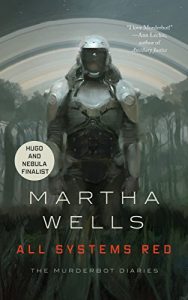 Escape Rating A-: As I’ve said in pretty much every review of an entry in The Murderbot Diaries except that first joint review of the first three books in the series (All Systems Red, Artificial Condition and Rogue Protocol), this seventh entry in the series is not the place to become acquainted with Murderbot’s brand of snarkasm. Start with All Systems Red. and buckle up for a wild ride.
Escape Rating A-: As I’ve said in pretty much every review of an entry in The Murderbot Diaries except that first joint review of the first three books in the series (All Systems Red, Artificial Condition and Rogue Protocol), this seventh entry in the series is not the place to become acquainted with Murderbot’s brand of snarkasm. Start with All Systems Red. and buckle up for a wild ride.
For those of us who have been following Murderbot’s (mis)adventures from the beginning, this one feels like it starts a bit in the middle – perhaps even more than usual. And the somewhat dystopian, corporate controlled universe that Murderbot inhabits has become complex enough that I felt a bit lost at the beginning.
Which is also somewhat fitting, as Murderbot is definitely kind of lost at the beginning of the story. So a whole lot of this one is Murderbot being uncertain about itself and its competence, dealing with that uncertainty badly – as it deals with all the emotions it claims it doesn’t have. All the while, the situation in which it and its humans are currently endangered is every bit as FUBAR’d as usual.
Murderbot’s only good days are the ones where it gets to watch its space operas in peace – and those days are generally rare. And none of the days since its humans arrived at this colony have been anywhere near that good.
While the foreground story is of Murderbot’s crisis of confidence and its rise to that challenge, the situation in which it takes place is a combination of humans behaving both badly and humanly, and of the desperation of humans on all sides as the verities of their worldview – however terribly and skewed, begin to erode.
Therefore, in the background of the story, it’s clear that Murderbot’s system is not the only one that is collapsing. Its personal collapse is something that can be fixed – or at least dealt with. But the system of corporate hegemony/control/tyranny of this universe is showing signs of its inevitable collapse – a situation that I hope to see come to the foreground in future installments of this series, especially in the two untitled entries yet to come.

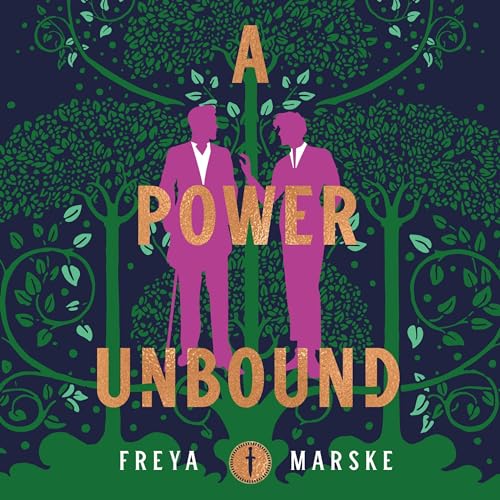 A Power Unbound (The Last Binding, #3) by
A Power Unbound (The Last Binding, #3) by 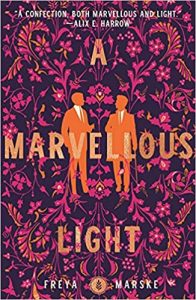 This series,
This series, 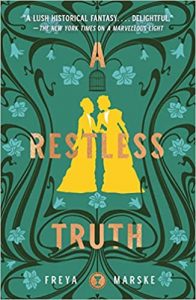 But the balancing act between the romance and the magical mystery tour started to tip in the second book in the series. I did enjoy
But the balancing act between the romance and the magical mystery tour started to tip in the second book in the series. I did enjoy 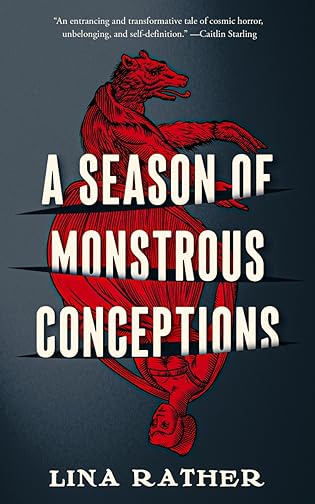 A Season of Monstrous Conceptions by
A Season of Monstrous Conceptions by 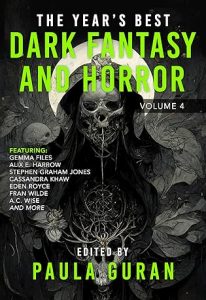 Escape Rating A-: You remember that
Escape Rating A-: You remember that  Under the Smokestrewn Sky (The Up-and-Under, #4) by
Under the Smokestrewn Sky (The Up-and-Under, #4) by  We have come, at last, to the final chapter of Zib and Avery’s journey into and hopefully through the Up-and-Under. It’s a journey that has taken them from their ordinary and mundane homes – even if Zib’s and Avery’s definitions of ordinary and mundane are entirely opposite to one another – and sent them along the Improbable Road on an equally improbable journey through every single one of the elemental kingdoms in the Up-and-Under.
We have come, at last, to the final chapter of Zib and Avery’s journey into and hopefully through the Up-and-Under. It’s a journey that has taken them from their ordinary and mundane homes – even if Zib’s and Avery’s definitions of ordinary and mundane are entirely opposite to one another – and sent them along the Improbable Road on an equally improbable journey through every single one of the elemental kingdoms in the Up-and-Under. It’s Avery’s bit of stubborn backsliding that pushes the story off the Improbable Road and into their very last set of adventures in the Up-and-Under. Adventures that will have a much bigger impact than any of them imagined when they began.
It’s Avery’s bit of stubborn backsliding that pushes the story off the Improbable Road and into their very last set of adventures in the Up-and-Under. Adventures that will have a much bigger impact than any of them imagined when they began. No matter the age of the protagonists, this has been the story of an epic fantasy quest that combines bits of Narnia with elements of Wonderland. Zib and Avery have been brought to the Up-and-Under to fix what’s gone wrong there, while for Zib and Avery the quest is to find their way home. It’s not going to end in a big battle between good and evil, because those concepts aren’t exactly the same in the Up-an-Under as they are back home. Instead, it’s a quest to put the out-of-balance back into balance – even if some of what they see looks like evil to Zib and Avery’s – especially Avery’s – eyes.
No matter the age of the protagonists, this has been the story of an epic fantasy quest that combines bits of Narnia with elements of Wonderland. Zib and Avery have been brought to the Up-and-Under to fix what’s gone wrong there, while for Zib and Avery the quest is to find their way home. It’s not going to end in a big battle between good and evil, because those concepts aren’t exactly the same in the Up-an-Under as they are back home. Instead, it’s a quest to put the out-of-balance back into balance – even if some of what they see looks like evil to Zib and Avery’s – especially Avery’s – eyes. Into the Riverlands (The Singing Hills Cycle, #3) by
Into the Riverlands (The Singing Hills Cycle, #3) by 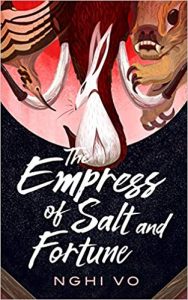 The entire
The entire 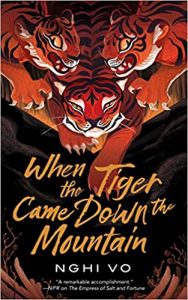 Escape Rating A+: At first, Into the Riverlands seems as if it’s a play on the Canterbury Tales, with Cleric Chih taking the place of Geoffrey Chaucer himself (who, come to think of it, by certain definitions was himself a ‘cleric’). Into the Riverlands is a journey, and every person in the party has at least one story to tell. It’s Chih’s duty to record those stories – not to become a part of one themselves.
Escape Rating A+: At first, Into the Riverlands seems as if it’s a play on the Canterbury Tales, with Cleric Chih taking the place of Geoffrey Chaucer himself (who, come to think of it, by certain definitions was himself a ‘cleric’). Into the Riverlands is a journey, and every person in the party has at least one story to tell. It’s Chih’s duty to record those stories – not to become a part of one themselves.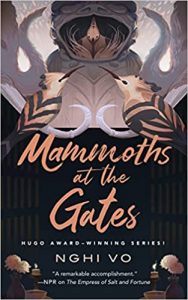 But, as I said in last week’s review of
But, as I said in last week’s review of 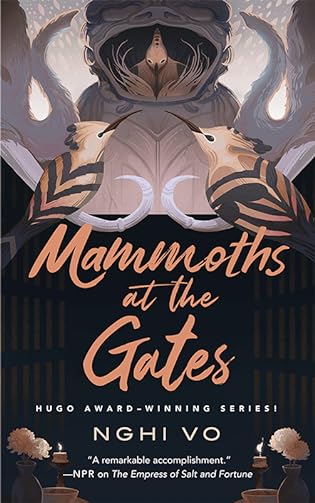 Mammoths at the Gates (The Singing Hills Cycle, #4) by
Mammoths at the Gates (The Singing Hills Cycle, #4) by  It’s also a heartbreakingly beautiful tale of a truth that sets no one free, and a love that both transcends and transforms death.
It’s also a heartbreakingly beautiful tale of a truth that sets no one free, and a love that both transcends and transforms death. Wild Spaces by
Wild Spaces by 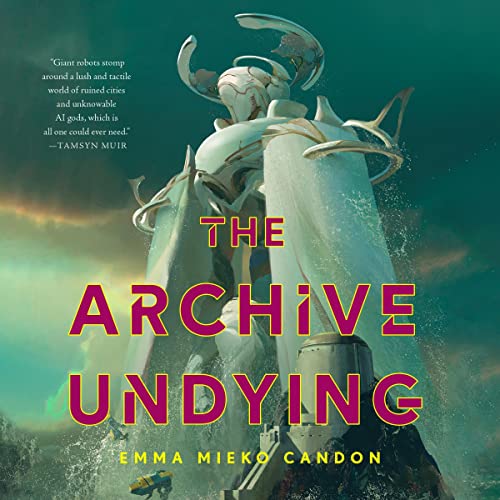 The Archive Undying (The Downworld Sequence, #1) by
The Archive Undying (The Downworld Sequence, #1) by 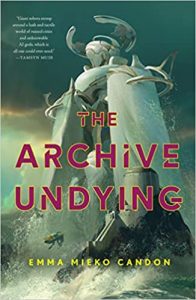 Escape Rating B: I listened to The Archive Undying in its entirety, and I have to say that its the narrator that carried me through all SIXTEEN AND A HALF HOURS. The narrator didn’t just do a good job of voicing all the many, many characters, but by literally being in their heads and not my own it allowed me to care enough about the individuals to be willing to experience the whole constantly twisting saga. If I’d been reading this as text, if I’d been in my head instead of theirs, I’d have DNF’d fairly early because the sheer number of changes in perspectives combined with unsatisfying hints of the world they occurred in would have driven me mad in short order. YMMV.
Escape Rating B: I listened to The Archive Undying in its entirety, and I have to say that its the narrator that carried me through all SIXTEEN AND A HALF HOURS. The narrator didn’t just do a good job of voicing all the many, many characters, but by literally being in their heads and not my own it allowed me to care enough about the individuals to be willing to experience the whole constantly twisting saga. If I’d been reading this as text, if I’d been in my head instead of theirs, I’d have DNF’d fairly early because the sheer number of changes in perspectives combined with unsatisfying hints of the world they occurred in would have driven me mad in short order. YMMV.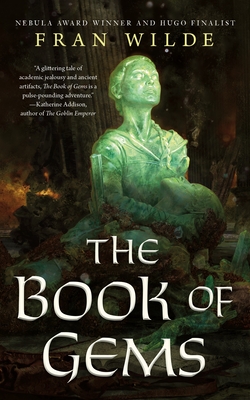 The Book of Gems (Gemworld, #3) by
The Book of Gems (Gemworld, #3) by 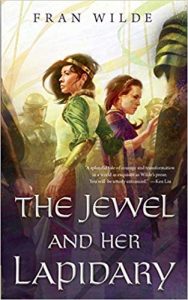 The Book of Gems is the third book in the
The Book of Gems is the third book in the 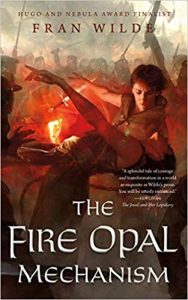 Escape Rating A-: I originally picked up
Escape Rating A-: I originally picked up 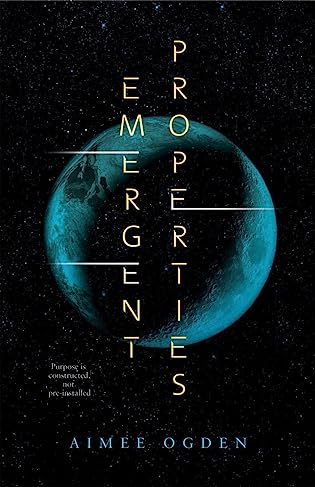 Emergent Properties by
Emergent Properties by